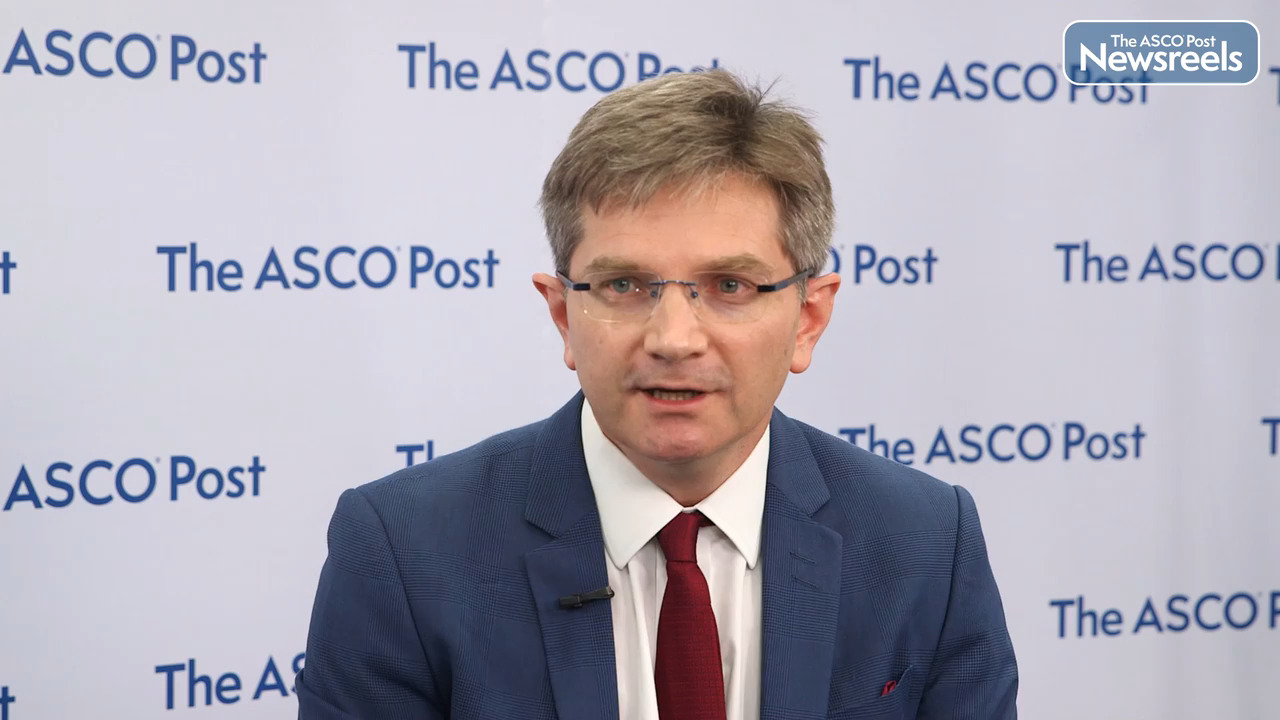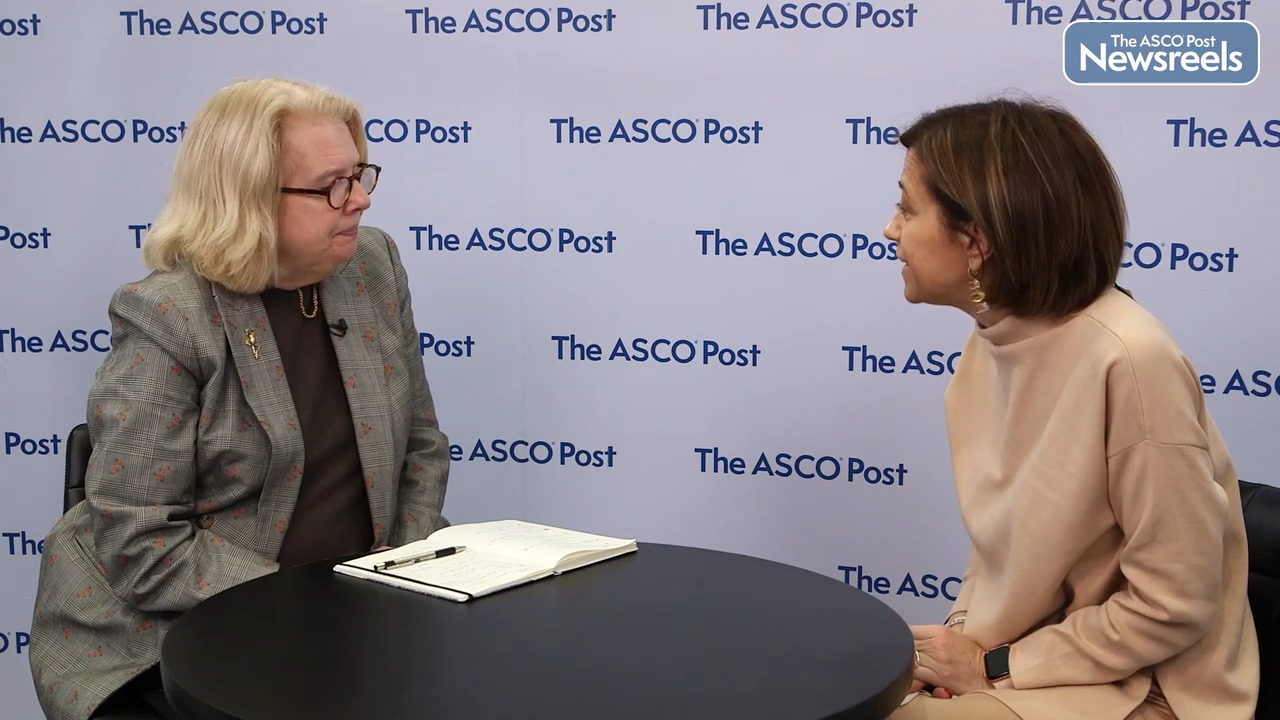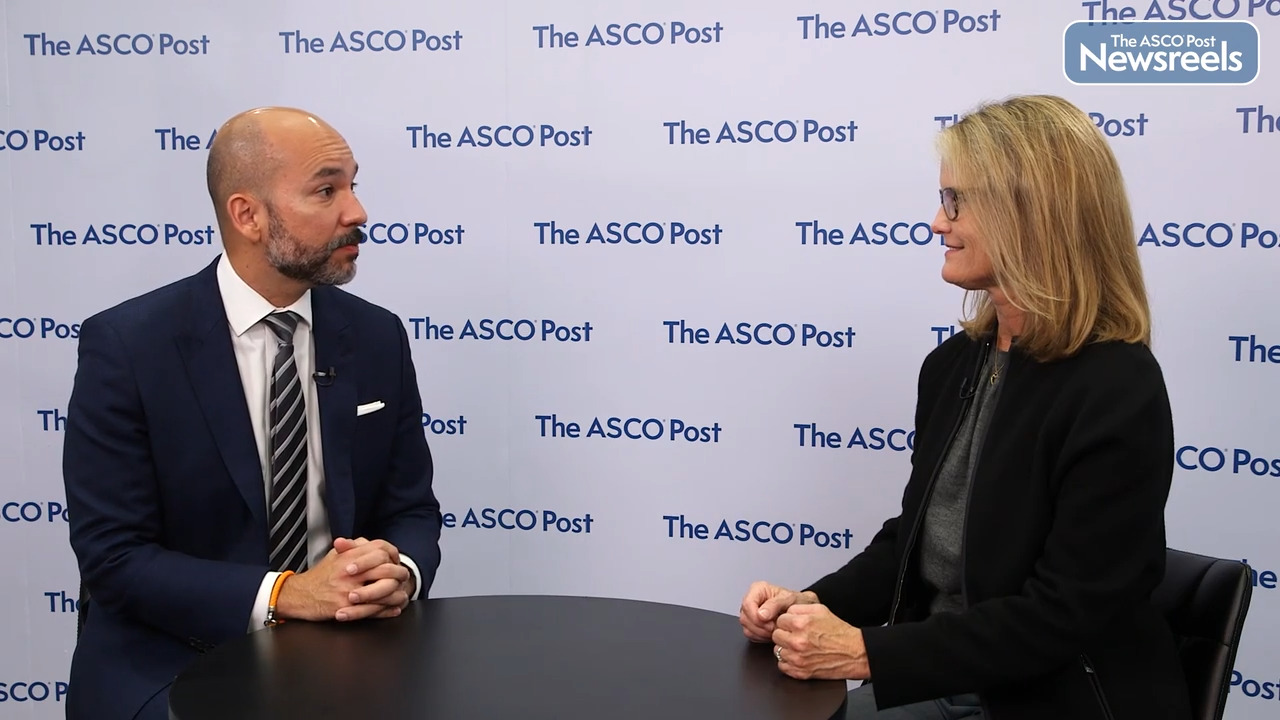Tara B. Sanft, MD, on How Diet and Exercise May Affect Completion of Chemotherapy for Breast Cancer
2022 ASCO Annual Meeting
Tara B. Sanft, MD, of Yale University, discusses the results of the LEANer study (Lifestyle, Exercise, and Nutrition Early After Diagnosis) in women with breast cancer. It showed that patients with newly diagnosed disease who were just starting chemotherapy could improve physical activity and diet quality. While both groups had high rates of treatment completion, women in the intervention who exercised at or above the recommended levels did better in terms of treatment completion, with fewer dose reductions and delays (Abstract 12007).
Transcript
Disclaimer: This video transcript has not been proofread or edited and may contain errors.
We know completing chemotherapy as prescribed is important for cancer outcomes. We also know that adopting healthy diet and exercise is important, both for cancer prevention and, in certain cancers, can improve cancer-related survival. The healthy diet and exercise guidelines include eating a predominantly plant-based diet and exercising with moderate intensity exercise at least 150 minutes per week, and performing two strength training sessions per week. Our study, the Lifestyle, Exercise, and Nutrition Study, randomized women who were not meeting these guidelines to a healthy diet and exercise intervention based on the Diabetes Prevention Protocol and adapted using the cancer-related guidelines as well versus usual care, which is referral to our survivorship clinic and dieticians and exercise programs at request by the patient. Our primary outcome was looking at the relative dose intensity, or the actual amount of chemotherapy received compared to that which was prescribed. The intervention group received a year-long intervention of 16 sessions administered by a registered dietician who was certified, specialized in oncology, and also had exercise counseling training. The control group were followed at baseline post-chemotherapy. What we found was that both groups completed chemotherapy at very high rates, with both groups approaching about 93% completion rates. This is higher than what we had found in the literature before. We also found that the number of dose delays and reductions were similar between the two groups. When we looked at the intervention group, in particular, and we looked at if they were meeting the actual recommendations, that is 150 minutes per week and a high consumption of fruits and vegetables, we found that women who were able to meet these guidelines or exceeded them, did have higher completion rates compared to those who didn't quite make those guidelines. So in summary, the women who made the highest number of changes or adhered the best did have better relative dose intensity and fewer dose reductions and delays. But when we took the entire intervention group and compared them to usual care, we did not find a statistically significant difference. In summary, both groups completed their chemotherapy as prescribed most of the time, and the intervention group significantly improved both their diet and physical activity during the course of the intervention. Those who were able to adopt the exercise and diet recommendations the best did have significant improvements in their completion rates and fewer dose reductions and delays compared to those who didn't adopt it as well.
Related Videos
The ASCO Post Staff
Benoit You, MD, PhD, of Lyon University hospital (HCL, France) and GINECO group (France), discusses findings from the GOG-0218 trial of patients with ovarian cancer, which appears to confirm earlier data on the link between poor tumor chemosensitivity and benefit from concurrent plus maintenance bevacizumab. In Dr. You’s validation study, patients who derived the most progression-free and overall survival benefit from bevacizumab were those with high-risk disease (stage IV or incompletely resected stage III) associated with an unfavorable KELIM score (CA-125 kinetic elimination rate constant, calculable online) (Abstract 5553).
The ASCO Post Staff
Clifford A. Hudis, MD, of the American Society of Clinical Oncology, and Karen E. Knudsen, PhD, MBA, of the American Cancer Society, discuss their collaboration, pooling their research and education resources to help empower patients with cancer and their families. Within 48 hours, Drs. Hudis and Knudsen were able to gear up a rapid response to the crisis in Ukraine, forming a clinical corps of volunteers to post information online in multiple languages, which helped patients navigate their care in the war-torn region. To date, 300 European cancer organizations have joined their efforts.
The ASCO Post Staff
Ursula A. Matulonis, MD, of Dana-Farber Cancer Institute, and Domenica Lorusso, MD, PhD, of Italy’s Gemelli University Hospital, discuss phase III data from the MITO23 trial on single-agent trabectedin vs clinician’s choice of chemotherapy in patients with recurrent ovarian, primary peritoneal, or fallopian tube cancers of BRCA-mutated or BRCAness phenotype. Although trabectedin has demonstrated antitumor activity in relapsed platinum-sensitive disease, it does not appear to improve survival outcomes when compared with standard chemotherapy in the BRCA-mutated population (Abstract LBA5504).
The ASCO Post Staff
Gilberto de Lima Lopes, Jr, MD, MBA, of the Sylvester Comprehensive Cancer Center at the University of Miami, and Karen L. Reckamp, MD, of Cedars-Sinai Medical Center, discuss phase II findings from substudy S1800A of the Lung-MAP protocol. The data showed that ramucirumab and pembrolizumab improved overall survival compared with the standard of care for patients with advanced non–small cell lung cancer who were previously treated with immunotherapy and platinum-based chemotherapy (Abstract 9004).
The ASCO Post Staff
Eunice S. Wang, MD, of Roswell Park Comprehensive Cancer Center, discusses long-term phase II findings of a trial evaluating crenolanib plus chemotherapy in newly diagnosed adults with FLT3-mutant acute myeloid leukemia. The study showed a composite complete remission rate of 86%. With a median follow-up of 45 months, median overall survival has not been reached. A phase III trial is ongoing (Abstract 7007).





